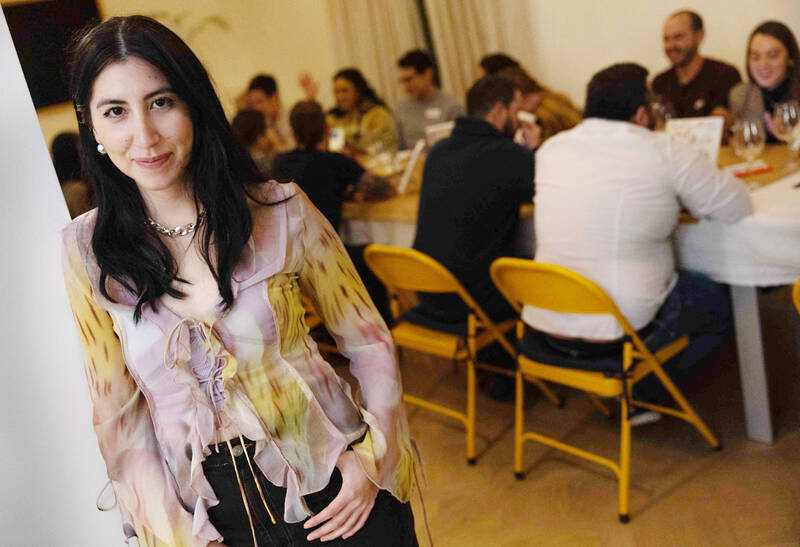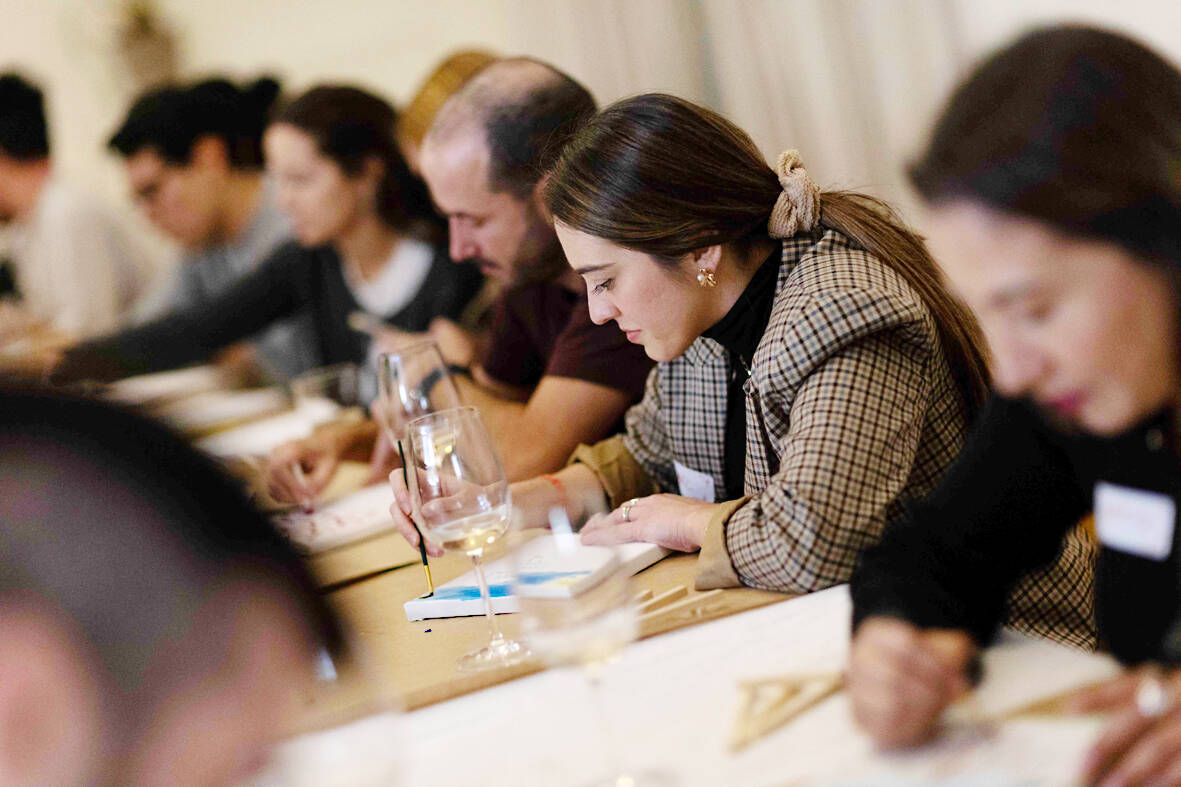Jilted on dating apps but undeterred in the quest for romance, 20 young singles gathered in Madrid to share activities and flirtatious smiles in a rediscovery of real-life love.
The 10 men and 10 women, aged between 25 and 35, had eyed up each other nervously barely an hour before their first plunge into the “slow dating club.”
The concept is gaining popularity in Europe as youngsters fall out of love with apps and try to find their potential soul mate through serendipitous face-to-face encounters.

Photo: AFP
Eva Sanchez, 28, launched the club in the Spanish capital to rekindle her romantic flame after a potential suitor she met online “ghosted” her — suddenly cutting off all communication — with no explanation.
“My generation wants healthy relationships, but applications have created pessimism in love. We find it hard to believe in it,” the creative director said.
Once a month, the Spanish-Peruvian organizes a cocktail with a different venue and theme where participants pay around 30 euros (US$31) to mingle around games and manual activities.

Photo: AFP
The singles “don’t feel like they are on a date” and “everything is a reason to bring out their cutest side,” said Sanchez, who plasters the walls of Madrid with posters promoting her club.
Dating app giants Tinder, Bumble, Meetic and Grindr have seen their downloads tumble by almost 20 percent since 2020, according to Sensor Tower, an agency that analyses digital data.
The stock market valuation of Match Group, the parent company of Tinder, Hinge and Meetic, has slumped from its peak of 47 billion euros in 2021 to 7.7 billion euros more recently.
‘WEIRD OR INTRUSIVE’
The younger generation increasingly “prefers to meet people in person rather than online,” said Sensor Tower’s Seema Shah.
One of the participants at Sanchez’s event, Damian, knows the “murky underside” of dating apps all too well after working on their algorithms as an IT developer.
“I decided to meet people in real life, by going out and socializing. It’s harder,” the 33-year-old Franco-Spaniard said.
Isabel, a 28-year-old Chilean jurist, agreed that people “are almost scared to come up to your table” for fear of seeming “a bit weird or intrusive.”
“We have become so used to the screen that we have lost this attraction for direct interaction with people as our parents used to do,” she said.
With their revenues falling, online dating companies have been forced to diversify their offering with group activities or informal meetings.
An expat group run by Briton Tom Hopcroft has also prioritized in-person meetings, targeting new arrivals in Madrid and Barcelona on his Instagram page with sessions that are fully booked.
‘CHANGES THE PARADIGM’
Psychologist Esther Jimenez has seen at first hand how the young patients she receives in her Madrid practice are growing “disenchanted.”
Online dates are “consumed, but without an intention to really connect with the other person, more as entertainment,” said the couples specialist.
“For that reason lots of despair is showing up among the young who would like to meet someone to share their life with. Their self-esteem is affected.”
Jimenez believes “slow dating is working because it changes the paradigm... you assume you will meet other people keen on the same thing as you, connecting with others.”
The expert said that the method prospective daters use matters less than how they use it.
“Are we consuming people or seeking connections?”
In a hyper-connected society where “the widespread feeling of loneliness is scary,” we must remember that “ultimately we are gregarious and we need others, that’s why we seek connections,” Jimenez said.

Most heroes are remembered for the battles they fought. Taiwan’s Black Bat Squadron is remembered for flying into Chinese airspace 838 times between 1953 and 1967, and for the 148 men whose sacrifice bought the intelligence that kept Taiwan secure. Two-thirds of the squadron died carrying out missions most people wouldn’t learn about for another 40 years. The squadron lost 15 aircraft and 148 crew members over those 14 years, making it the deadliest unit in Taiwan’s military history by casualty rate. They flew at night, often at low altitudes, straight into some of the most heavily defended airspace in Asia.

Taiwan’s democracy is at risk. Be very alarmed. This is not a drill. The current constitutional crisis progressed slowly, then suddenly. Political tensions, partisan hostility and emotions are all running high right when cool heads and calm negotiation are most needed. Oxford defines brinkmanship as: “The art or practice of pursuing a dangerous policy to the limits of safety before stopping, especially in politics.” It says the term comes from a quote from a 1956 Cold War interview with then-American Secretary of State John Foster Dulles, when he said: ‘The ability to get to the verge without getting into the war is

Like much in the world today, theater has experienced major disruptions over the six years since COVID-19. The pandemic, the war in Ukraine and social media have created a new normal of geopolitical and information uncertainty, and the performing arts are not immune to these effects. “Ten years ago people wanted to come to the theater to engage with important issues, but now the Internet allows them to engage with those issues powerfully and immediately,” said Faith Tan, programming director of the Esplanade in Singapore, speaking last week in Japan. “One reaction to unpredictability has been a renewed emphasis on

Beijing’s ironic, abusive tantrums aimed at Japan since Japanese Prime Minister Sanae Takaichi publicly stated that a Taiwan contingency would be an existential crisis for Japan, have revealed for all the world to see that the People’s Republic of China (PRC) lusts after Okinawa. We all owe Takaichi a debt of thanks for getting the PRC to make that public. The PRC and its netizens, taking their cue from the Chinese Communist Party (CCP), are presenting Okinawa by mirroring the claims about Taiwan. Official PRC propaganda organs began to wax lyrical about Okinawa’s “unsettled status” beginning last month. A Global